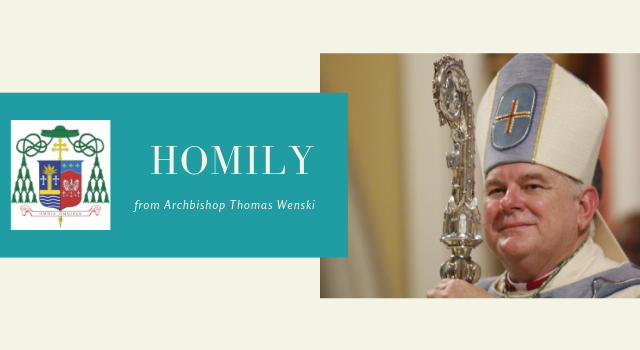By Archbishop Thomas Wenski - The Archdiocese of Miami
Archbishop Thomas Wenski preached this homily at Bridging the Gap, a professional day for priests, parish staff and school principals, held Oct. 11, 2022 at Msgr. Edward Pace High School in Miami Gardens. Bridging the Gap, started 10 years ago, was organized jointly by the offices of Development, Schools, and Evangelization and Parish Life.
Today, by a happy coincidence – or a God-incidence – we are holding this “bridging the gap” meeting on the feast day of Pope St. John XXIII, the “good pope” who convened the Second Vatican Council on this day, Oct. 11, 1962. The Council would bring about many changes in the Church – and many of those changes are still unfolding. That we have this “bridging the gap” meeting is a direct – and not unimportant – result of the changes introduced by the Second Vatican Council.
What motivated John XXIII to hold an ecumenical council? I would hazard to say that it was his way of faithfully responding to Jesus’ question to Peter in today’s Gospel reading. “Do you love me?” Jesus asked. John XXIII, as the successor of St. Peter, gave his answer, and it was the same as Peter’s, “Yes, Lord, you know that I love you.” And as Jesus told Peter, he also told John XXIII, “feed my lambs, tend my sheep.”
The Second Vatican Council continues to feed us today. Of course, over the years, some have misinterpreted the council, others have simply misunderstood it. A common misunderstanding – and misinterpretation – was that the Council wanted to update the Church – so that the Church would get with the times. But John XXIII’s intent, and the “updating” the Council had meant to achieve, was not to surrender the Church to spirit of the present age. John XXIII wasn’t about changing the Church – at least in her essentials – he was about changing the world by the power of the Gospel of Jesus Christ, the same yesterday, today, and forever. Vatican II was about the Church rediscovering herself as essentially an evangelical movement. The purpose of the Church is, as it always was, to announce Jesus Christ – who saves us from our sins and brings us to new hope.
The crisis of our modern or post-modern age can rightly be described as a crisis of hope. The social pathologies of our time – abortion, drug abuse, promiscuity, suicide, divorce, and the breakup of the family – are symptomatic of a loss of hope. A woman who would kill the fruit of her womb has no hope for the future – for children are our hope. A man who would poison himself through drug abuse has no future. Even those who nominally identify themselves as Christians or Catholics betray a loss of hope in their abandonment of regular Church attendance and reception of the sacraments: for prayer is essentially an expression of hope. Only those who hope pray.
Some of those who had misinterpreted the Second Vatican Council as a surrender to the modern age did so because they also misinterpreted the crisis of modernity as crisis of faith – rather than one of hope. They held that modern man (and woman) could not believe anymore in the classic propositions of Christianity and that if the Christian faith was to survive it would have to adapt to the modern mentality. Such efforts to adapt the faith – or as some would say to “dumb it down” – failed: Modern man’s problem was not that he could not believe but that he was so credulous he could believe anything. We see this credulity in so many of the things we, moderns, accept as true.
The modern age was born in the Enlightenment philosophies of the 17th and 18th centuries. These philosophies essentially denied that man was made for anything more than to die. Closing the door to the Infinite meant closing the door to a future of hope. Then in the 19th and the 20th centuries, various ideologies, thinking that the possibility of any heavenly paradise was effectively debunked, offered ersatz hopes promising earthy paradises. Rather than delivering “heaven on earth,” these ideologies – whether political, like communism or fascism, or social, like consumerism or hedonism – brought “hell on earth.” Faith in “science” or in “progress” has also proven a disappointingly untrustworthy substitute for Christian hope. As Pope Benedict said, “Man needs God; otherwise, he remains without hope” (SS #23).
As Christians, we know we have a future – a future revealed to us by the Son of God who in taking on our flesh pitches his tent in our midst only to lead us to communion with the Father. This hope is trustworthy, as the lives of the saints give witness – and thus hope enables us to face our present. The present, even if it is arduous, can be lived and accepted if it leads towards a goal, if we can be sure of this goal, and if this goal is great enough to justify the effort of the journey, namely eternal life with God (cf Benedict SS #1).
No ministry in the Church is sustained without faith or without prayer, and as I said only those who hope pray. That’s ultimately how we bridge the gaps — through faith and prayer, through courage – like the courage of St. John XXIII in convening the Council – that resists defeatism and the gray pragmatism of low expectations.
St. John XXIII, pray for us. May we feed the Lord’s sheep in our efforts to bridge the gaps.

